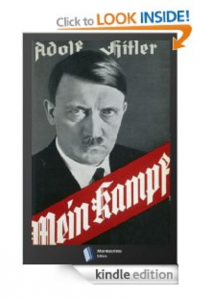January 10, 2014
Mein Kampf is a surprise ebook bestseller
by Zeljka Marosevic
According to the website Vocativ.com, the ebook of Mein Kampf is so in-demand that it qualifies as a bestseller in numerous ebook catergories, and free versions have been downloaded over 100,000 times from the Internet Archive.
Author Chris Faraone tracked the mounting success of Mein Kampf in online stores:
For a year now, [Mein Kampf] has loomed large over current best-sellers on iTunes, where at the time of this writing two different digital versions of Mein Kampf rank 12th and 15th on the Politics & Current Events chart alongside books by modern conservative powerhouses like Sarah Palin, Charles Krauthammer, and Glenn Beck.
As well as this, one version is number one in the Propaganda & Political Psychology section on Amazon, while another is number eight in the Globalization category. In the UK, Alison Flood writes for the Guardian, a 99p version ‘tops Amazon.co.uk’s propaganda and spin chart and its fascism and Nazism chart, and sits in second place in its political science and ideology bestseller list.’
Faraone pins the book’s success in the US to a 99-cent version that was launched in 2013 by the Californian publisher Elite Minds Inc. They released the cheap edition as a marketing tool which they hoped would promote their expensive print and audio editions. But it’s clear the publisher has been surprised with the book’s stand-alone success. Elite Minds Inc. President Michael Ford commented rather uncomfortably:
Sales are great,” but notes that he faces “a moral dilemma in promotion” in that he fears advocating “something that could be misused.” He says, “I have not heavily promoted the book and decided, for the most part, to let it spread among those who have a true historical and academic interest naturally.”
Faraone believes interest in the book is a result of what he describes as “the 50 Shades phenomenon coupled with latent curiosity that’s easily sated with a click.” By which he means, with the rise of e-readers, it’s easier for someone to buy something relatively taboo and hide it in the privacy of their e-reader screen. And then to delete it just as easily once they have had a look. There’s also the fact that the Houghton Mifflin hardcover comes in at 694 pages, making a digital version a much lighter prospect. Argues Faraone:
People might not have wanted to buy Mein Kampf at Borders or have it delivered to their home or displayed on their living room bookshelf, let alone get spotted reading it on a subway, but judging by hundreds of customer comments online, readers like that digital copies can be quietly perused then dropped into a folder or deleted.
What this description suggests is a growing general interest in the book; academics wouldn’t really care about having the book out or on display but the general reader might. While it’s understandable that people are curious about this historic text, it cannot be known what other intentions readers might have for the book, and how it may be continuing to influence.
Zeljka Marosevic is the managing director of Melville House UK.
